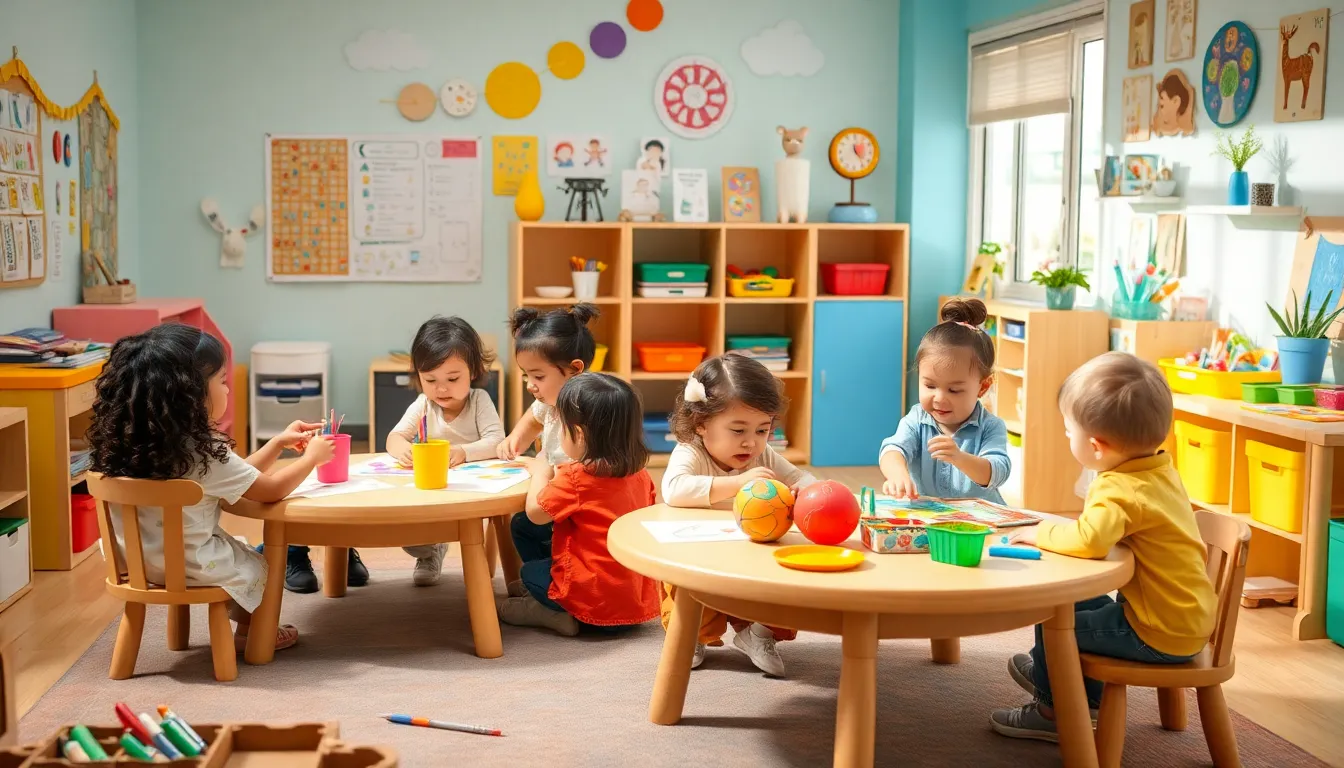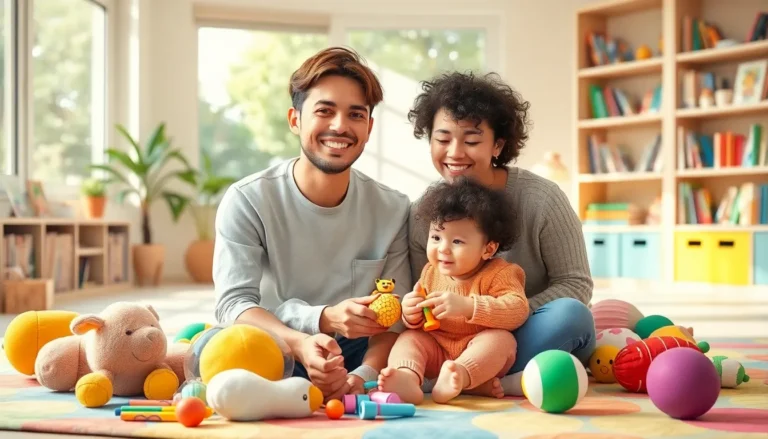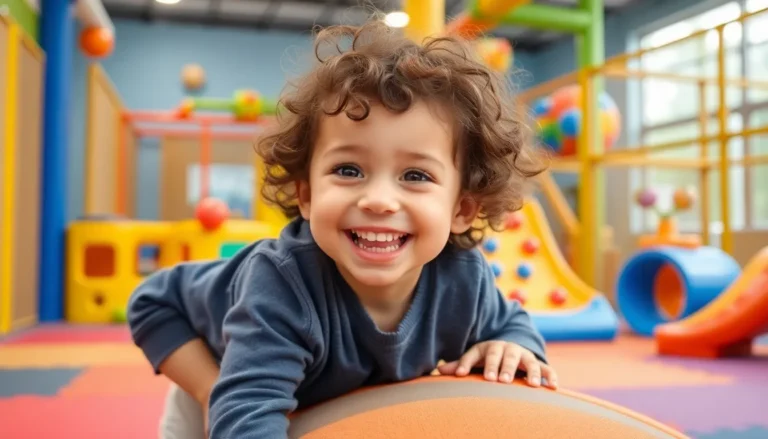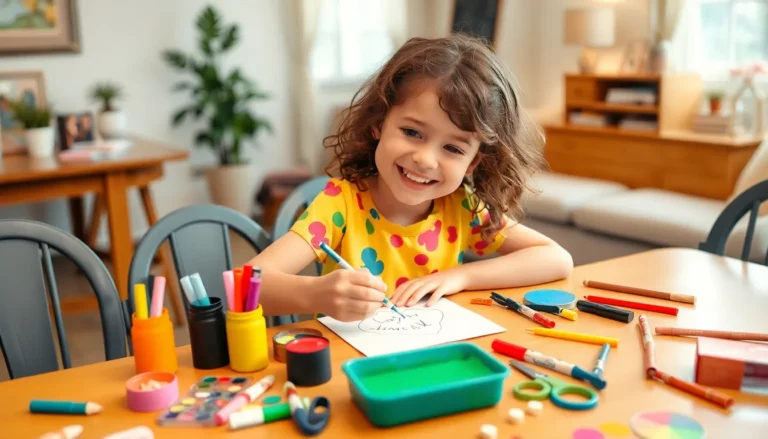Toddlers are like tiny tornadoes of energy, curiosity, and mischief. Keeping them engaged can feel like herding cats, but small group activities offer a magical solution. Not only do these activities spark joy and laughter, but they also help little ones develop essential social skills and teamwork.
Small Group Activities For Toddlers
Small group activities play a crucial role in toddler development. Such interactions foster social skills as children learn to share, take turns, and communicate. They gain experience in collaboration, enhancing their ability to work with others. Engagement in these activities boosts emotional intelligence by enabling toddlers to express feelings and understand the emotions of peers.
Development of language skills occurs naturally during small group play. Toddlers practice vocabulary through conversations and storytelling, which enhances their overall communication. By listening and responding to others, they improve their comprehension and language use.
Cognitive skills also see improvement through these activities. Problem-solving arises when toddlers encounter challenges in group scenarios. They learn to think critically and make decisions, vital skills for future learning.
Physical development remains another key benefit. Small group activities often include movement, helping toddlers enhance motor skills. Activities like block building or simple games involve coordination and balance, which support physical growth.
Lastly, small group settings create a sense of community. Toddlers develop friendships, which provide emotional support and security. This connections foster a sense of belonging, contributing to their overall happiness and well-being.
Utilization of small group activities not only entertains toddlers but shapes their future interactions. Engaging with peers in structured environments builds foundational life skills necessary for later academic and personal success.
Types Of Small Group Activities

Small group activities provide structured engagement for toddlers, offering opportunities for development and fun. Here are some effective types of activities.
Creative Arts And Crafts
Creative arts and crafts engage toddlers’ senses while encouraging imagination. Painting allows children to express themselves using various colors and textures. Working with clay fosters fine motor skills, as they mold and shape their creations. Activities like collage making promote sharing and collaboration. Simple crafts, such as bead threading, enhance hand-eye coordination and provide a sense of accomplishment. These projects encourage creativity and strengthen social interactions through shared experiences.
Physical Play Activities
Physical play activities promote gross motor skills and provide an outlet for energy. Group games like tag or obstacle courses stimulate movement and coordination. Dancing sessions allow toddlers to explore rhythm while practicing body control. Ball activities, such as rolling or tossing, enhance teamwork and communication as they work together to achieve goals. Finally, outdoor exploration encourages curiosity and connection with nature. Emphasizing fun, these activities also contribute to a child’s overall physical development.
Interactive Storytelling
Interactive storytelling captivates toddlers’ attention while fostering language skills. Using puppets or props enhances engagement and makes stories come alive. Encouraging toddlers to participate by mimicking sounds or actions promotes active listening. Group discussions about the story nurture communication and critical thinking. Simple question prompts allow for expression and help build vocabulary. Sharing stories in small groups cultivates a love for reading, while strengthening social bonds through shared narratives.
Benefits Of Engaging In Small Groups
Small group activities provide significant advantages for toddlers. These settings promote interaction, learning, and emotional connection.
Social Skill Development
Social skills thrive in small groups. Sharing toys fosters cooperation, while taking turns builds patience. Communication happens naturally through discussions and play. These interactions teach toddlers how to express feelings effectively. Engaging with peers also helps them learn non-verbal cues, such as body language. Developing empathy occurs when toddlers understand each other’s perspectives. Group activities encourage problem-solving with peers, enhancing critical thinking skills. Overall, small groups create essential social environments that prepare toddlers for future relationships.
Emotional Growth
Emotional growth benefits greatly from small group situations. Toddlers learn to articulate their feelings, increasing self-awareness. Playing with peers aids in developing resilience, as they encounter both triumphs and challenges. Experiencing shared joy encourages bonding, reinforcing a sense of belonging. Additionally, navigating conflicts teaches essential skills for emotional regulation. Support from caregivers during these activities boosts toddlers’ emotional security. Experimenting with diverse roles in play enhances their ability to adapt. Ultimately, small groups nurture emotional intelligence, laying a strong foundation for personal well-being.
Tips For Organizing Small Group Activities
Organizing small group activities requires thoughtful planning. Utilizing strategies ensures enjoyable and beneficial experiences for toddlers.
Choosing Appropriate Themes
Selecting suitable themes for activities enhances engagement. Consider interests such as animals, seasons, or colors. Incorporating themes allows toddlers to connect experiences to the real world. For example, an animal theme engages children with animal sounds and movements. Seasonal themes provide opportunities for exploration, like autumn leaves or spring flowers. Engaging themes stimulate creativity, ensuring toddlers remain focused and excited throughout the activities. Connecting themes to familiar experiences fosters a sense of security, essential for encouraging participation.
Ensuring Inclusivity And Engagement
Fostering an inclusive environment supports every child’s participation. Arranging activities that cater to diverse developmental levels ensures all toddlers can engage. Adaptations, such as providing varied materials or altering task complexity, help every child feel included. Group setups encourage teamwork, promoting peer interactions and communication. Rotating roles during activities allows toddlers to experience different aspects, maintaining interest and reducing frustration. Activities should also facilitate shared experiences, which cultivate connections among children. Encouraging positive reinforcement boosts confidence and keeps the atmosphere enjoyable for all participants.
Conclusion
Small group activities for toddlers are invaluable in nurturing their growth and development. These experiences not only entertain but also build essential social skills and emotional intelligence. As toddlers engage with peers in a supportive environment, they learn to communicate effectively and navigate their feelings.
By incorporating a variety of activities that cater to different interests and abilities, caregivers can create enriching experiences that foster connections and boost confidence. Ultimately, investing time in small group activities lays a strong foundation for toddlers’ future interactions and success in both social and academic settings. Embracing these moments can lead to lasting friendships and a sense of community that benefits every child involved.




